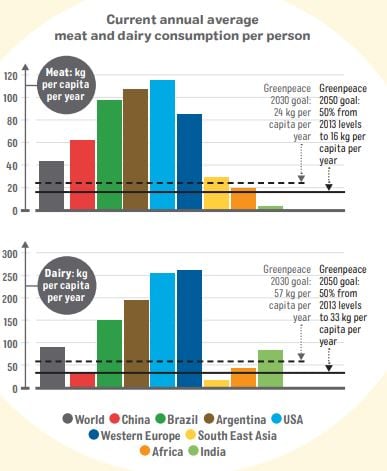In a Greenpeace report published today, Less is more: reducing meat and dairy for a healthier life and planet, it calls for a 50% global reduction in the production and consumption of animal products by 2050.
The livestock industry is massively contributing to water pollution, land pressure, antibiotic resistance and greenhouse gas emissions, the need to reduce demand for livestock products is now "a scientifically mainstream view," writes former convening lead author for the Intergovernmental Panel on Climate Change (IPCC), Professor Pete Smith, in a foreword to the report.
Despite this urgency and general scientific consensus, EU agricultural policies are driving us “towards an environmental cliff edge”, according Greenpeace’s EU agriculture policy director, Marco Contiero.
The target: 300 g of meat a week
Cutting the amount of animal-based products we eat will have a real impact, reducing greenhouse gas emissions from the agriculture sector by 64%

compared to projected emissions using 2050 baseline trajectories, it says.
The NGO is advocating a “shrink and share approach” for a more equitable access to animal products across both developed and developing countries. Its overall aim is a global intake of 16 kg of meat per person per year, or about 300 g per week.
It’s an ambitious target. The average individual in the US eats almost 120 kg per year, the average Western European just over 80 kg.
In fact, out of all the global regions considered in the report (China, Brazil, Argentina, USA, Western Europe, South-East Asia, Africa and India), the only one that eats less than 16 kg of meat per year is India, where vegetarianism is commonplace.
Contiero told FoodNavigator: “Eating fruit and vegetables that are processed as little as possible should be as much a part of our culture and diet as eating meat is now. Seventy years ago in Europe eating meat was something of value.”
The amount is in line not just with environmental objectives but also public health.
Old eating habits die hard
The fact remains, however, that most people in the West have always known meat to be a ubiquitous, everyday food, and old habits die hard.
The economic importance of the farming sector has shaped our culinary habits. In the Netherlands, Contiero said, dairy plays an important role both economically but in terms of eating habits, while the same is true for Denmark’s pig sector and the beef sector in France and Ireland.
Does that mean that plant-based proteins, meat analogues and cellular agriculture are (part of) the answer?
“The ideal scenario is for diets dominated by fruit and vegetables because we get all the necessary nutrients from those, including protein and nutrients such as zinc and iron. Whether alternative [proteins] should be meat-like products is a different question,” Contiero said.
“Any processed food involves a loss of nutrients so it depends how the alternative has been prepared and its nutritional properties.
Greenpeace has no official position on lab grown meat but Contiero said it was still a niche solution. "And what is needed is systemic change".
While some types of meat have a greater climate impact than others – beef compared to chicken, for instance, the explosion in global poultry consumption means its environmental footprint is huge.
Between 1990 and 2013, while there was a 10% decrease in global beef consumption per capita, there was a 23% increase in pork and a striking 96% increase in poultry consumption.
Greenpeace is therefore calling for a reduction of all meat and animal-based products.
A policy change
One of the biggest obstacles will be instigating real change at a policy level, he said. In the Europe’s Common Agricultural Policy (CAP) for instance, the fact that farming is one of the world’s biggest polluting industries is not even acknowledged.
“This one sector is impacting the quality of our air, water and soil, it is changing our climate and impacting public health. It is simply too big to leave it to DG Agriculture alone to decide on the future of the CAP.”
To give an indication of the scale of the problem, €59 billion is paid into the CAP each year, which represents 40% of the EU budget. The cost of nitrogen pollution alone, such as contaminated run-off and algae bloom, is worth €320bn a year, he said.
Greenpeace wants to see less animal husbandry in general but also more investment into ecological farming models.
The other DGs as well as parliamentary committees and national policymakers (not just agricultural ministers) should be involved, Contiero said.
“There needs to be a new governance system that allows all sectors to discuss together. At the minute we are in silos and DG Agriculture has exclusive power in decision-making.”
Attitudes in general are changing, however.
Contiero said: “We are starting from the same position as we were on climate change 20 years ago. Back then nobody would have imagined a Directorate General for Climate Action or international climate agreements.”
